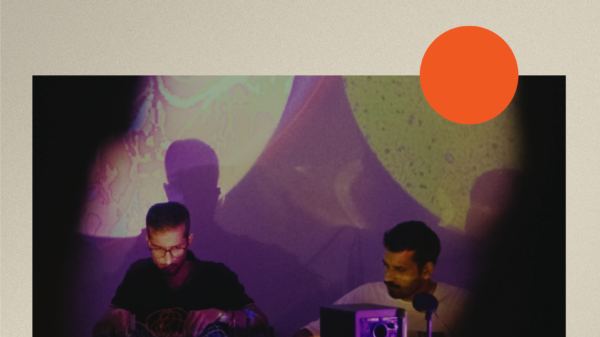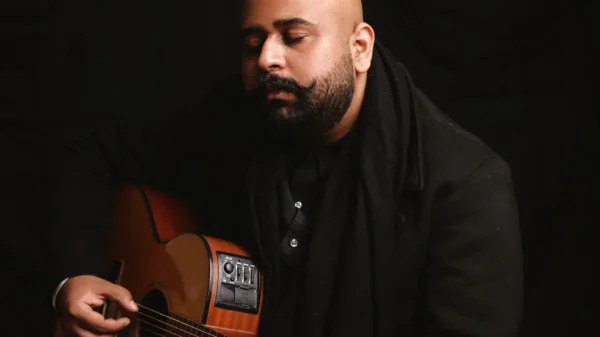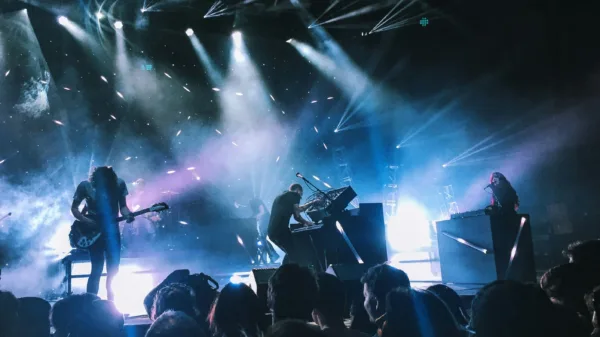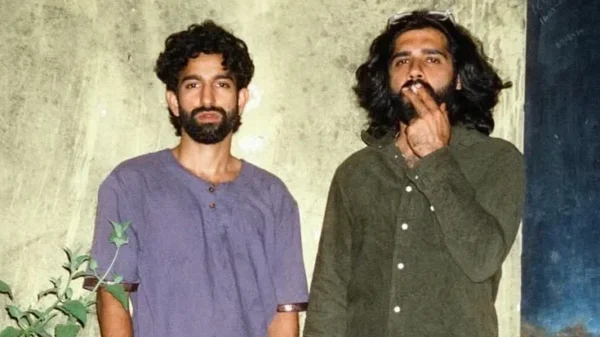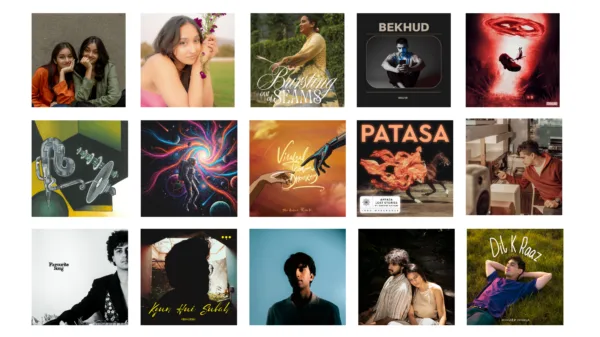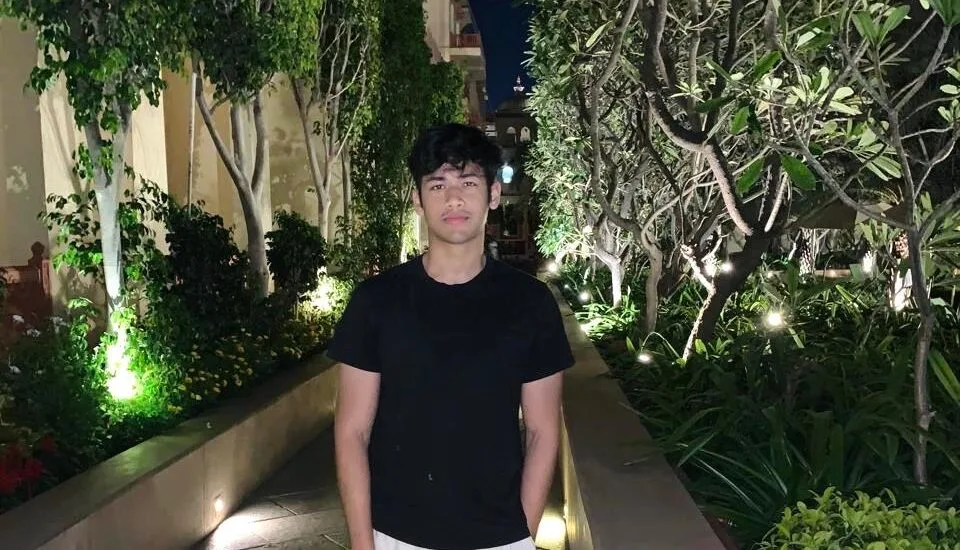It is not everyday that one encounters a prodigious artist – an 18 year old juggling his college education with his promising musical career – one that involves being the name behind some of the biggest desi hip-hop tracks in the country. New Delhi’s Janesh Arya, popularly known as Lambo Drive is a revelation in his own right. With an unmistakable echo of a producer tag that props up before tracks like Maharani [alongside Karun, Arpit Bala and ReVo LEKHAK], Monica [Teesri Duniya], Peaking [Nanku], and having an extensive discography that features names (besides the aforementioned ones) like Seedhe Maut, Prabh Deep, Raftaar and Frappe Ash – he has cemented himself as one of the most reliable and recognisable names in the industry, while creating diverse soundscapes that show his range. In conversation with The Indian Music Diaries, the producer discusses his inspirations, processes, his ambitions, interspersing them with personal anecdotes that testify to his unique creative intelligence.
Firstly, what was the reason behind choosing Lambo Drive as your producer name?
There’s a very random story behind this. My name was among the cringe ones, I had named myself Make The Money initially. Then I heard a track, probably a Travis Scott one, and it had “lambo drive” as an ad-lib. I had no other ideas for a name at that moment, and this one kind of stuck. My first track was with Seedhe Maut — they used to come live on YouTube, and I would spam their comments urging them to give me their email id so that I could send them my beats. I had Lambo Drive as my name then, and whenever they saw me there, they would greet me with a whole “Lambo aa gaya, Lambo aa gaya”. Also, their song MMM has a shoutout that goes “Sez aur lambo saari hai ye mili bhagat” – yeah, so I kept that.
Have you ever thought of using an alternate name, or using your actual name to produce or go on separate music ventures using it?
I mean, if there is a copyright strike from Lamborghini, then maybe. But no plans as such right now.
You started producing at 13, what was that process like? How did you find your way into music production?
There is a story behind this one too. I was fascinated, I used to listen to a lot of EDM back then, artists like Marshmello and others. So I lied to my friends that I had made these songs. With time I got so caught in the lie, that I realized I had to learn music production. I looked through YouTube, and for a year or two, I just did this — 24/7. That is how, I think, I accumulated my own interest.

Did you think that this would last this long? Had you sort of had a vision that this would be your career, later?
No, I hadn’t thought about anything on a long term basis initially. It was more of a fun process for me. I’ll tell you when it started settling in — that I could be doing this in the long run. This happened when the track with Seedhe Maut came out. The song did well, and the duo were pretty famous back then too. There are a lot of people who keep producing, and doing stuff, but nothing ends up coming out. I think it was by luck and by making good music – and all of that, that the track was released, and my name was out there. After that, I started gaining an Instagram following, and I also ended up forming connections with a lot of up-and-coming artists and interacting with them further gave me the motivation to keep doing this.
Did you know that you wanted to produce Desi Hip-Hop tracks, or was it a more generalized approach?
I took the opportunities that came my way. I was very desperate for rappers to get on my beats. I would slide into their dms. I used to spam comments sections of artists’, asking them to check their DMs, and open their emails. I think a few are still there, people keep sending them to me. Now, I have tried to delete all of them. I think I was hyper-motivated, I was so persistent – How could they not be listening? In hindsight, I know it gets irritating, because it happens to me too, now. However, it worked back then. Everyone has to do it, the less you get embarrassed, the better it is for you.
One of your very prominent collaborators has been Prabh Deep. What was the inception of that?
I had sent him a beat on WhatsApp. Here’s the story, I had somehow found his number out – he used to have it on his Instagram back then. So I randomly called him, and asked him to listen to the beats that I’d sent him, which I’d done on WhatsApp. He hadn’t replied then, but he did hit me up later. Out of the first beats that I’d sent him, the Qaabu intro was one of them.
You made your solo debut with Field Frequency, what was the vision behind that one? Do you plan to release an album or a more composite work with similar tracks?
This one doesn’t have a long story to itself. Prabh Deep had started his own venture : purple wav, and it was a big opportunity for me. They wanted instrumental tracks, and I made one for them.
As for solo projects, I do not see myself making just instrumentals. I do not want a song out there without vocals – because people won’t listen to just acapella, or just beats. People open the app to listen to a finished product. I am working on a producer project for myself.
Did you have any vision for yourself when you started out – things you wanted to do with your career, etc.?
I did not, back then. However, I do now. I want to do something Bollywood-esque — Diljit Dosanjh, like Bharg has done — people like that. I want the beats I make to be used where something good is being made. I do not want them to be wasted. My motive is to reach a wider audience.
Who are some Indian producers whose work you admire, or want to collaborate with?
See, the people I am about to mention are my friends : there’s Gnrs, Kriday, and there’s Baajewala. I am the closest to them, I haven’t interacted with producers as much. There’s also Leonik, he makes great melodies. Eyepatch also comes to mind. I think Nanku is great too, as a producer.
On that note, are there any producers who have acted as influences/inspirations ?
Of course, there are a number of people. One of my biggest inspirations is Ronny J. I know this is very unexpected. He uses the “Oh my God, Ronny” producer tag. I used to download his songs, and try to recreate them. That is how I learnt production, by recreating others’ tracks. I’d call this process rattafication. Besides Ronny J, Pharell Williams also inspires me a lot. Metro Boomin, too, in fact.
How has co-production worked out for you? Do you enjoy the process?
I haven’t co-produced that many projects. Oh, there was Uday and Ahmer’s project AZLI. Those songs were 60-70% done, but they felt like the tracks lacked something. So I executive produced the project for them, and I finished one track per day. My experience with co-production has been great, when two creative minds come together, the process is always good. I think previously, it used to be more about working on our own projects, but nowadays I do feel like observing someone else’s work too — I feel like your own ideas get reignited when you work with someone else.
Which of these collaborations, do you think, has impacted you the most creatively?
I don’t think there is anything like that, to be honest. My process is very different, I treat it like a job. It’s almost mechanical. I don’t really put a lot of my own emotions into my work. I put the artist first. When I am working on a personal project, I do prioritize my own artistry, but otherwise I prioritize the artist’s vision — how they perceive the project. There are a few instruments I like using, primarily Indian and Arabic ones, like you can hear me use the sitar, harmonium, organs, electric keys — I’d taken a lot of inspiration from Timbaland regarding this.
Music production also entails a business aspect to itself. Since you started out so young, were there any problems regarding that?
Thankfully, nothing bad has really happened. I did not know how to make invoices in the beginning. I didn’t even know how to reply to emails properly. No one’s ripped off my work yet, either. I hope it does, I’ll come around announcing that someone’s stolen my beats.
Do you think your age has acted as an impediment at any point in your career — where people have not taken you seriously and the like?
No, it was quite the opposite. If I could, I’d tell people I’m 12 years old. I’d rather lie and say that I was born with a laptop. I think it’s better if you start young. It always sounds better if someone says that a 12 or a 13 year old is making music, rather than a 30 year old is doing it. Age was never the factor, I think it gave me the space to ask things that would be considered “stupid” or “dumb” now.
When did people around you start taking notice that you had been producing music? What was their reaction?
My family knew right from the beginning. My laptop would create a lot of noise, so I used to get into the cupboard and work in there. There was never really a restriction from people at home, I studied well too. People I knew started finding out once Maharani took off. It was fun seeing my relatives start following me.
How are you handling your life at college and your music career simultaneously? Does it get difficult?
I don’t think you can handle things simultaneously as such. There’s one thing or the other that faces a setback, college has taken a slight hit. However, I am still figuring things out – how to manage my time, because my first year just ended. With music, there will be times when you sit around for 3 hours and end up making nothing. For me, the process is like this : I never think that I am going to make this thing. Instead, I listen to samples, I try out melodies, drum patterns. Sometimes I will sit and something will get made, other times, that won’t happen. So this entire process is very long and time-consuming. I’ll be at my laptop for 6 hours. So when you’re spending hours there, then you’re handling college, and the other parts of your life, it becomes very difficult to fit it all into a day. The thing is, when you are making music, you have to come and sit in front of your laptop. No matter how distracted you are, you need to give time to it. I am lucky that when I started out, I had a lot of time. I have memorized it – my fingers have developed a muscle memory of sorts, where they know the whereabouts of everything. Now, I don’t have to sit everyday, because I know how to do things, but yes, you have to sit with your laptop. There are times when nothing gets made and your day gets ruined.
Have things changed for you now that you have a developing fan following?
A lot of people keep telling me that I am famous in college, but I have never really felt that. I think you feel good that you have made something, that you made something on your computer that people are listening to, that is a big deal. It becomes a matter of self worth, almost a good, positive ego. I’ll do my work on my own. As I said, it is about self-worth, I don’t really mind being alone. You know, I used to lock myself in my room and make beats, isolated, and that is why I really have a good relationship with myself. I don’t really mind not getting attention as such. I think I am quite content with myself.
Talk to us a little about your upcoming projects.
Karun bhaiya is building a project. I have been told that it has got a large chunk of my beats. You’ll get to see a lot of musicality on this one, I have got longer beats on it. It’s got guitars, drums, and we have made a sitar outro on it. It is a very musically heavy project, I think my best beats are on that project.
I am also working on a project of my own, which will feature rappers, artists etc. These are the two projects I am primarily excited about. There is a big artist I am working with, but I will not reveal it right now – things get jinxed, you know.
The things that I left out on other people’s projects, things that I thought would otherwise be too over-the-top, this project features those elements. I could tell the artists to work on specific topics, topics that I personally relate to. See, I am 18, there are not a lot of experiences that I have had to make songs. I have had good experiences, and when I ask an artist to write something related to that, and he writes on that — it becomes a sort of personal storytelling.
The project has songs that are hard-hitting, nothing too sad. I prefer happier songs, if you listen to them, you’ll feel good. My idea of music is one where it uplifts people’s moods.






